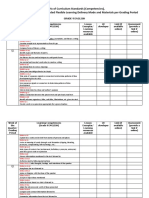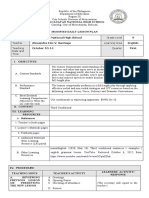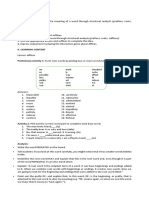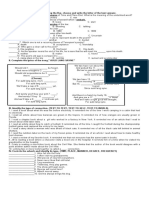Judging The Relevance and Worth of Ideas
Judging The Relevance and Worth of Ideas
Uploaded by
Joan Besa BasmayorCopyright:
Available Formats
Judging The Relevance and Worth of Ideas
Judging The Relevance and Worth of Ideas
Uploaded by
Joan Besa BasmayorOriginal Description:
Original Title
Copyright
Available Formats
Share this document
Did you find this document useful?
Is this content inappropriate?
Copyright:
Available Formats
Judging The Relevance and Worth of Ideas
Judging The Relevance and Worth of Ideas
Uploaded by
Joan Besa BasmayorCopyright:
Available Formats
JUDGING THE RELEVANCE AND WORTH OF IDEAS, SOUNDNESS OF
AUTHOR’S REASONING, AND EFFECTIVENESS OF THE PRESENTATION
In this time of pandemic at the digital age, online media play a crucial
role as we obtain much of the information, we need through many
platforms available such as YouTube, Instagram, Facebook, Twitter, etc.
Each provides rapid dissemination of information, which also allows us
to access news to keep us updated. But we have to remember that not
everything we see or hear in social media is true. Therefore, we should
learn how to assess and filter data before we react or believe in a
certain issue.
As we try to gather information from various sources or platforms to
keep us updated, our capability to judge the truthfulness and relevance
of ideas is imperative. We must remember that before we believe the
articles or materials we have obtained, we should check first if it is
factual or misleading. Thus, we must know the different tips on how to
distinguish factual or truthful information from a faulty one.
RELEVANCE is how appropriate something is to what is being said at a
given time.
TRUTH is something that has been proven by facts or sincerity.
Tips on How to Spot Factual or Truthful Information
1. CONSIDER THE SOURCE. Investigate the site you are viewing or
reading.
2. READ BEYOND. Headlines can be outrageous in an effort to get
clicks, so you should focus on the whole story. You have to read and
look for details such as statistics, date, name, etc.
3. CHECK THE AUTHOR. Do a quick search on the author to find out if
they are real and credible.
4. VERIFY SUPPORTING SOURCES. Determine if the given information
actually supports the story.
5. CHECK THE DATE. Reposting old news stories does not mean they’re
relevant to current events. It should be updated.
6. CHECK YOUR BIASES. Consider if your own beliefs could affect your
judgement.
REMEMBER THIS!
Checking the legitimacy of the information will keep us from being a
victim of fake news or faulty information. While as a receiver of
information, we need to sharpen our skill in judging the relevance and
worth of one’s ideas, since we may have to use it as bases of our
personal decisions in some situations.
You might also like
- For Conversation Eng.9 Reading Comprehension HandoutDocument1 pageFor Conversation Eng.9 Reading Comprehension Handoutanon_929267893No ratings yet
- Judging The Relevance and Worth of IdeasDocument29 pagesJudging The Relevance and Worth of IdeasMarielle Dominique De la CruzNo ratings yet
- MAKING VALUE JUDGMENT ON CRITICAL ISSUES-activity SheetDocument1 pageMAKING VALUE JUDGMENT ON CRITICAL ISSUES-activity SheetAudrey Ann Tugad PinasNo ratings yet
- Learning Activity Sheet - G9 - EnglishDocument5 pagesLearning Activity Sheet - G9 - EnglishHANNAH GARDOSENo ratings yet
- Grade 9 ConceptualizationDocument31 pagesGrade 9 ConceptualizationMyeshaena MarcialNo ratings yet
- Matrix of Curriculum Standards (Competencies), With Corresponding Recommended Flexible Learning Delivery Mode and Materials Per Grading PeriodDocument8 pagesMatrix of Curriculum Standards (Competencies), With Corresponding Recommended Flexible Learning Delivery Mode and Materials Per Grading PeriodEvan Maagad LutchaNo ratings yet
- Expressing Permission Using ModalsDocument3 pagesExpressing Permission Using ModalsJOHN CHRISTIAN TAPARANONo ratings yet
- Sensory ImagesDocument29 pagesSensory ImagesGlaiza Carla FanoNo ratings yet
- GRADES 1 To 12 Daily Lesson Log Grade 9 English Week 2 First Quarter I. Objectives Monday Tuesday Wednesday Thursday FridayDocument7 pagesGRADES 1 To 12 Daily Lesson Log Grade 9 English Week 2 First Quarter I. Objectives Monday Tuesday Wednesday Thursday FridayVince Rayos CailingNo ratings yet
- Final English 9 Q3 W5 Determining Relevance and Truthfulness of Material Viewed LASDocument6 pagesFinal English 9 Q3 W5 Determining Relevance and Truthfulness of Material Viewed LASTC F. SawiNo ratings yet
- MultimediaDocument39 pagesMultimediaLerma Morales ManaloNo ratings yet
- English 8 - Second Quarter-First Week: Objectives MelcDocument6 pagesEnglish 8 - Second Quarter-First Week: Objectives MelcJOEVANNIE S. PAGAURANo ratings yet
- E7 Q2 M3 (A) - Source InformationDocument29 pagesE7 Q2 M3 (A) - Source InformationVictoria Angela CastroNo ratings yet
- Division Training On Literacy Instruction: Cuasito, Alfie Marquez - Malamawi NhsDocument3 pagesDivision Training On Literacy Instruction: Cuasito, Alfie Marquez - Malamawi NhsAlfie CuasitoNo ratings yet
- English: Junior High School - Grade 9Document12 pagesEnglish: Junior High School - Grade 9Makoy AguilaNo ratings yet
- English7 Q1 Wk5 Past-PerfectTenseDocument11 pagesEnglish7 Q1 Wk5 Past-PerfectTenseRose Ann SelomNo ratings yet
- Day 2 Determining The Truthfulness and Accuracy of The Material ViewedDocument17 pagesDay 2 Determining The Truthfulness and Accuracy of The Material ViewedVincent Ian TañaisNo ratings yet
- Modals of Permission Obligation and ProhibitionDocument12 pagesModals of Permission Obligation and Prohibitionjo2honnyNo ratings yet
- Semi - Detailed Lesoon Plan. English Grade 9Document3 pagesSemi - Detailed Lesoon Plan. English Grade 9NOREMIEG. CUÑADONo ratings yet
- Daily Lesson PlanDocument4 pagesDaily Lesson PlanPauline Karen ConcepcionNo ratings yet
- Weekly Learning Plan in English 9 - Module 3Document2 pagesWeekly Learning Plan in English 9 - Module 3RIZA SANDUYOGANNo ratings yet
- Lesson Plan DreamsDocument2 pagesLesson Plan DreamsCindy AlereNo ratings yet
- Eng9 q1 Mod3 Compose Forms of Literary Writing Version3Document32 pagesEng9 q1 Mod3 Compose Forms of Literary Writing Version3Jeneva CatalogoNo ratings yet
- Types of Communicative Styles Worksheets 2020Document2 pagesTypes of Communicative Styles Worksheets 2020Josie PabloNo ratings yet
- Differentiate Print and Non-Print MediaDocument5 pagesDifferentiate Print and Non-Print MediaUser LeftNo ratings yet
- Soundness and Reasoning (WEEK 2)Document44 pagesSoundness and Reasoning (WEEK 2)VERBA, Desiree CuelloNo ratings yet
- Englishlp Biasandprejudicegrade9 220504115813Document4 pagesEnglishlp Biasandprejudicegrade9 220504115813Gilda TangposNo ratings yet
- 1stQ Summative Test in G7 EnglishDocument4 pages1stQ Summative Test in G7 EnglishHADJA KAREN GALLARDONo ratings yet
- Overcoming Indifference - by The Railway Side - Alice MeynellDocument31 pagesOvercoming Indifference - by The Railway Side - Alice MeynellMA. STELLA MACATUMBASNo ratings yet
- Research Campaign Advocacy 1Document25 pagesResearch Campaign Advocacy 1PandaNo ratings yet
- Creative Nonfiction QUIZ #1Document1 pageCreative Nonfiction QUIZ #1Maryjane CaymeNo ratings yet
- Day 1 - Claims and EvidencesDocument10 pagesDay 1 - Claims and EvidencesDhem Paul Nikko A. PeñalosaNo ratings yet
- Emphasis MarkersDocument25 pagesEmphasis MarkersAndrea M. IbañezNo ratings yet
- Eng9 Q1 Mod4 ExplainHowTheElementsSpecific Version3Document24 pagesEng9 Q1 Mod4 ExplainHowTheElementsSpecific Version3Jeneva CatalogoNo ratings yet
- Lesson Plan Grade 7 - 3RD WeekDocument5 pagesLesson Plan Grade 7 - 3RD WeekMARIELLA ABELLANo ratings yet
- DLL - ENG 9 - Q2 - Making Inferences From What Was SaidDocument6 pagesDLL - ENG 9 - Q2 - Making Inferences From What Was SaidRando Estañero MonsaludNo ratings yet
- Oral Language, Stance and Behavior G7Document13 pagesOral Language, Stance and Behavior G7Ronald Randolph delaCruz ValezaNo ratings yet
- O S I R P 5 1: Detailed Lesson Plan in ENGLISH Grade 9Document10 pagesO S I R P 5 1: Detailed Lesson Plan in ENGLISH Grade 9Daniel Gatdula FabianNo ratings yet
- Determinevarioussocialmoralandeconomicissuesinthetextslistenedto 210419142643Document45 pagesDeterminevarioussocialmoralandeconomicissuesinthetextslistenedto 210419142643michael segundoNo ratings yet
- Modals Module 1Document3 pagesModals Module 1Eyphrille UmandapNo ratings yet
- Translation - Set BDocument9 pagesTranslation - Set BMeyhNo ratings yet
- L3 G 9 Communicative Styles For Various SituationsDocument12 pagesL3 G 9 Communicative Styles For Various SituationsJenny Liquigan TagacayNo ratings yet
- Semi Detailed Lesson Plan in Eng8Document5 pagesSemi Detailed Lesson Plan in Eng8Carmela BautistaNo ratings yet
- Essay On Modals of Obligation - Fayaz AhmedDocument15 pagesEssay On Modals of Obligation - Fayaz AhmedFayaz Alam Ahmed100% (1)
- Semi Detailed Lesson Plan in English 9Document7 pagesSemi Detailed Lesson Plan in English 9Ella Mae LisbeNo ratings yet
- English9Q2 Mod4 Wk4 Identifying The Types and Features of Short ProseDocument13 pagesEnglish9Q2 Mod4 Wk4 Identifying The Types and Features of Short ProseMa.Angelika Manalili100% (1)
- Department of Education: English 9 Quarter 2 Week 1-2Document11 pagesDepartment of Education: English 9 Quarter 2 Week 1-2Heidee BasasNo ratings yet
- What I Need To Know: Instructions: Supply The Appropriate Modal To Complete The Sentences Below. ChooseDocument13 pagesWhat I Need To Know: Instructions: Supply The Appropriate Modal To Complete The Sentences Below. ChooseMar SebastianNo ratings yet
- DLP Differentiate Bias PrejudiceDocument9 pagesDLP Differentiate Bias PrejudiceDemmie belle CaluyaNo ratings yet
- DLP Grade 9 Fallacy Fact OpinionDocument8 pagesDLP Grade 9 Fallacy Fact OpinionJanna Marie CaymoNo ratings yet
- TOS English 7 2nd Quarter Exam 2019 2020Document2 pagesTOS English 7 2nd Quarter Exam 2019 2020Elsie SumalhayNo ratings yet
- Learning Competency (Essential Competency)Document6 pagesLearning Competency (Essential Competency)Heidee BasasNo ratings yet
- Module 10 Writing Free Verse PoetryDocument10 pagesModule 10 Writing Free Verse PoetryTeacher anaNo ratings yet
- Grade 9 Module 5Document5 pagesGrade 9 Module 5Mae Ann PiorqueNo ratings yet
- Observation Lesson PlanDocument2 pagesObservation Lesson PlanChique LabuguenNo ratings yet
- English: Quarter 2, Wk.3 - Module 1 Give The Appropriate Communicative Styles For Various SituationsDocument11 pagesEnglish: Quarter 2, Wk.3 - Module 1 Give The Appropriate Communicative Styles For Various SituationsRyan Custodio MarcosNo ratings yet
- Instructional Plan in English 9 INSETDocument4 pagesInstructional Plan in English 9 INSETGlenmae LegaspiNo ratings yet
- New EDITEDv4 Q1 Module 6 ADM Engl7Document21 pagesNew EDITEDv4 Q1 Module 6 ADM Engl7Daisy FabaliñaNo ratings yet
- Patterns of Idea DevelopmentDocument21 pagesPatterns of Idea DevelopmentMariel delos AngelesNo ratings yet
- Relevance and TruthDocument26 pagesRelevance and Truthdelunam218No ratings yet
- English: Quarter 1 - Module 1: Modals: Prohibition, Obligation and PermissionDocument22 pagesEnglish: Quarter 1 - Module 1: Modals: Prohibition, Obligation and PermissionJoan Besa BasmayorNo ratings yet
- English 9Document2 pagesEnglish 9Joan Besa BasmayorNo ratings yet
- Long Quiz G9Document1 pageLong Quiz G9Joan Besa BasmayorNo ratings yet
- The Battle With GrendelDocument2 pagesThe Battle With GrendelJoan Besa BasmayorNo ratings yet































































